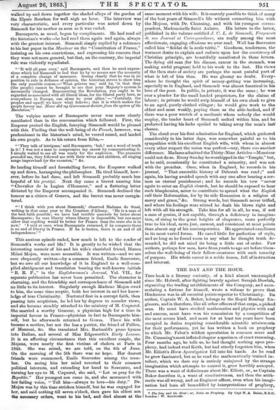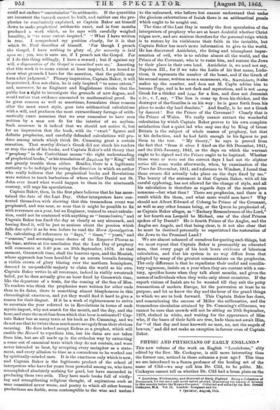THE DAY AND THE HOUR.
Tim book is a literary curiosity, of a kind almost unexampled since Mr. IIolwell, after fighting bravely against Surajah Dowlah, organizing the trading establishments of the Company, and accu- mulating a fortune for himself, wrote a volume to prove that Hindooism was in all essential points superior to Christianity. Its author, Captain W. A. Baker, belongs to the Royal Bombay En- gineers, and is therefore, like all other officers of that corps, a picked man. He must have studied mathematics and physics with zeal and success, must have won his commission by a competition of the most severe kind, and must for at least ten years have been occupied in duties requiring considerable scientific attainments for their performance, yet he has written a book on prophecy to which Mr. Faber's wildest speculation is common sense and Dr. Cumming's most inflated chapter a specimen of exact reasoning, Four months ago, he tells us, he had thought nothing upon pro- phecy, had indeed read Keith, but had utterly forgotten him, when Mr. Elliott's Sorg' Apocalypticte fell into his hands. As he read he grew fascinated, but as he read the mathematically trained in- tellect, which we dare say is entirely uninjured by the strange imagination which attempts to control it, grew horribly annoyed. There was a want of definiteness about Mr. Elliott, or, as Captain Baker describes it, a want of conclusiveness, and then the arith- metic was all wrong, and an Engineer officer, even when his imagi- nation had been all bemuddled by interpretations of prophecy, • The Dag and the How; or, Notes on Prophecy. By Capt W. A. Baker, B.B.E. London : W. Macamotb. could not endure " uncertainties "in arithmetic. If the quantities are incorrect the barrack cannot be built, and neither can the pro- phecies be conclusively explained, so Captain Baker sat himself down to 'make prophetical arithmetic exact, and in four months produced a work which, as he says with carefully weighed humility, is "to some extent inspired." " What I have written is true. I comprehend my position clearly, for it is that which St. Paul describes of himself. 'For though I preach the Gospel, I have nothing to glory of, for necessity is laid upon me ; yea, woe is unto me, if I preach not the Gospel. For if I do this thing willingly, I have a reward ; but if against my will, a dispensation of the Gospel is committed unto me.' Asserting that this work is to some extent at least inspired, I am bound to show what grounds I have for the assertion, that the public may form a fair judgment." Plenary inspiration, Captain Baker, it will be perceived, does not claim, he is only inspired " to some extent," and, moreover, he as Engineer and Englishman thinks that the public has a right to investigate the grounds of new dogma, and would rather that evidence amounted to mathematical proof. So he gives reasons as well as assertions, formulates those reasons after the most exact style, goes into arithmetical calculations with a will, and produces the most extraordinary farrago of arith- metically exact nonsense that we ever remember to have seen written by a man not fit for the interior of an asylum. Such nonsense is it indeed that we should not notice it, but for an impression that the book, with its " exact " figures and definite prophecies, and carefully defended calculations will pro- duce among minds which think Dr. Cumming great a certain sensation. That worthy divine's Greek did not shock his readers or stop the sale of his books, and Captain Baker's odd theory that " prophesy " in the Corinthians means "the right understanding of prophetical books," or his translation of gccoXgim by " King" will not greatly trouble them either. Besides, there is a legitimate curiosity to be indulged by seeing the direction in which an author who really believes that the prophetical books and Revelations were written to teach barbarians of whom neither Daniel nor St. John ever heard what would happen to them in the nineteenth century, will urge his speculations.
Captain Baker, then, in the first place believes that he has ascer- tained the date of the Last Day. Other interpreters have con- tented themselves with showing that this tremendous event was prophesied, and was near, so near that it might be possible to fix with reverence on a year, but an Engineer, trained to exact calcula- tion, could not be contented with anything so "inconclusive," and Captain Baker has fixed the day as clearly as any almanack, and having fixed it, will be just as anxious about the pension which falls due after it as he was before he read the Nora Apocalypticm. He, calculating all references to " days," " times," " years," and " seasons," and assuming some decree of the Emperor Phones as his base, arrives at the conclusion that the Last Day of prophecy will commence at 8.40 p.m. on 20th September, 1878. At that moment, Greenwich time, shall the heavens open, and the Messiah, whose approach has been heralded by an aurora borealis forming a visible crown of glory blazing over the northern hemisphere, descend in unspeakable majesty to claim the world as his own. Captain Baker writes in all reverence, indeed in visibly awestruck belief, yet he does actually give an hour Axed. by Greenwich time, like the departure of a train, for the coming of the Son of Man. To readers who think the prophecies were written for other ends than to fix dates, there is something almost blasphemous in this chronological exactness, and yet they would find it hard to give a reason for their disgust. If it be a work of righteousness to strive to ascertain the year referred to in Revelations in terms of such mystic import, why not search for the month, and the day, and the hour, and state the meridian from which that hour is estimated? Cap- tain Baker has as many texts at his back as Dr. Cumming, and we do not see that he twists them much more savagely from their obvious meaning. He does indeed accept Esdras as a prophet, which will enable the Record to repudiate him, but his dates are not taken from him, but are all made up in the orthodox way by extracting a sense out of canonical texts which they do not contain, and were never intended to bear, by accepting every metaphor as a state- ment, and every allusion to time as a conundrum to be worked out by spiritually-minded men. It is the exactness only which is new, and Captain Baker is the legitimate product of the school of interpreters who have for years been powerful among us, who have accomplished absolutely nothing for good, but have succeeded in producing these two evils. They have made books full of vivify- ing and strengthening religious thought, of aspirations such as man unassisted never wrote, and poetry to which all other human - productions are feeble, seem contemptible to the wise and useless to the unlearned, who believe but cannot understand that under the glorious exhortations of Isaiah there is an arithmetical puszle which ought to be sought out.
The time of the Last Day is usually the first speculation of the interpreters of prophecy who are at heart doubtful whether Christ reigns now, and are anxious therefore for the personal reign which is to restore by its visibleness their faith in the invisible, but Captain Baker has much more information to give to the world. He has discovered Antichrist, the living and triumphant imper- sonation of evil, who is to subdue almost all the world, and the Prince of the Covenant, who is to resist him, and restore the Jews to their place in their own land. Antichrist is, we need not say, Napoleon III., for if we take the Latin of his first name, Ludo- vicus, it represents the number of the beast, and if the Greek of his second name, written as on a monument, viz., Nagrajovrt, it also makes up the number, and does not M. Caylu advise him to become Pope, and is he not dark and mysterious, and is not yavog Greek for a thicket and AMY for a lion, and does not Jeremiah c. iv., v. 7, say, " The lion is come up from his thicket, and the destroyer of the Gentiles is on his way : he is gone forth from his place to make thy land desolate." And finally, is he not a Greek by descent ! But the Prince of the Covenant? Clearly that is the Prince of Wales. We really cannot extract the wonderful calculation by which Captain Baker proves to his own complete satisfaction that a quiet lad who may one day be King of Great Britain is the subject of whole masses of prophecy, but that is his deduction, and he had faith enough in his figures to put them to the test. " My theory," he says is proved from the fact that "from it alone I fixed on the 6th December, 1841, and the 25th January, 1842, as the days on which the warrant ought to be signed and the Prince ought to be baptized. Whether those were or were not the correct days I had not the slightest notion till some weeks afterwards, when, by examination of the Times for December, 1841, and reference to Windsor, I found that those events did actually take place on the days fixed by me." The beauty of the statement is that Captain Baker, with all his careful cyphering, has not allowed for the change of style, and all his calculation is therefore as regards days of the month pure nonsense—but what then? There are prophecies, and there is a result which fits them, and what more would men have ? Why should not Albert Edward of Coburg be Prince of the Covenant, as well as any other human being, or the Queen be prophesied of, as Captain Baker alleges, as " Zachary Remembrance of the Lord," or her fourth son Leopold be Michael, one of the chief Princes spoken of by Daniel? He is fourth Prince of the Angles, and the Angles are Angels, and that being clear, is it not also clear that he must be destined personally to superintend the restoration of the Jews to the Promised Land?
We are almost ashamed of ourselves for quoting such things, but we must repeat that Captain Baker is presumably an educated man, that every page of his book bears evidence of laborious calculation, and that his system in no way differs from that adopted by many of the greatest commentators on the prophecies. The only difference is that he repudiates their useful and concilia- tory vagueness, insists on a year when they are content with a cen- tury, specifies hours when they talk about months, and gives the names of individuals when they write only about countries. If the superb visions of Isaiah are to be wrested till they suit the petty transactions of modern Europe, let the perversion at least be to purpose, and let us know the day and the hour of the grand things to which we are to look forward. This Captain Baker has done, and remembering the success of Miller the millenarian, and the tremendous circulation attained by Dr. Cumming's sillinesses, we cannot be sure that crowds will not be sitting on 20th September, 1878, clothed in white, and waiting for the appearance of Him who, if the bases of their faith are true, bade them not await Him, for " of that day and hour knoweth no man, no, not the angels of heaven," and did not make an exception in favour even of Captain Baker.































 Previous page
Previous page